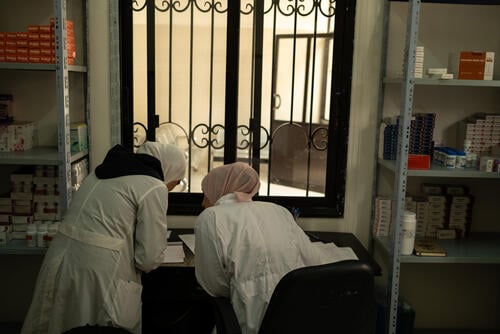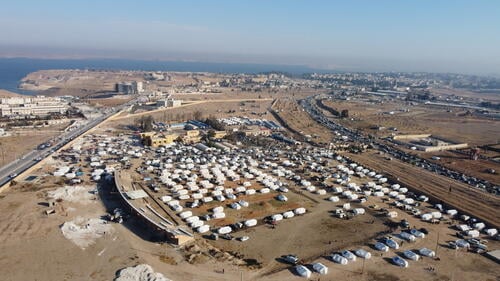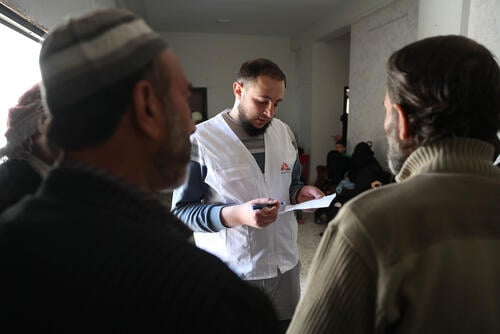- More than 80,000 people have been displaced in the areas of Tabqa, Raqqa, and Hassakeh in northeast Syria, according to local authorities.
- MSF is responding to people's developing needs by providing clean water, emergency shelter, and urgent medical care.
- There must be a dramatic scale up of humanitarian support to address the needs of these newly displaced people.
Amsterdam/ northeast Syria - Médecins Sans Frontières (MSF) is providing critical assistance to tens of thousands of people who have been displaced in northeast Syria following the significant contextual developments in the country. According to local authorities, more than 80,000 people have been displaced into the areas of Tabqa, Raqqa, and Hassakeh because of ongoing hostilities. Support from donors and the international community must be scaled up to address people’s needs.
In Tabqa, the stadium and schools are used to receive and shelter people as they arrive. The situation in these facilities is dire; they are not designed to house people. Temperatures have dropped below freezing and people do not have blankets or heating. Latrines, clean water, and food are all insufficient, as authorities have not had enough time or resources to prepare for people’s arrival. Existing medical services in some of the areas receiving displaced people have quickly become overwhelmed.
This was the second time we were displaced. There were airstrikes, gunshots, so we left the area. We hope one day we will go back to our village. Now the situation has changed everything.A woman who has recently been displaced
“We are originally from Afrin. This was the second time we were displaced,” says a woman. “There were airstrikes, gunshots, so we left the area. We hope one day we will go back to our village. Now the situation has changed everything.”
“For now, we don't have any plan,” she says. “We cannot go to Qamishli or Ain Al Arab because of money - we cannot afford it. We are waiting for good news every day to see if we can go back. If I had money I would go back to my village in Afrin.”
MSF has received reports of people facing multiple violations during their journey from Tal Rifaat, Shahba region, in northern Aleppo to northeast Syria.
“Shahba looked like a nightmare, we didn't know what was going on,” says a displaced man. “On the journey we faced many armed people. They threatened us. ‘We will follow you’, they said. They said bad words to us.”
“In the middle of the journey, after midnight, there was a convoy of 400 cars or more,” he says. “People with torches wearing military uniforms stopped us. People were shouted at to give their phones. They were wearing military uniforms, but we don't know who they were.”

“The situation faced by people who have been displaced is overwhelming,” says Allen Murphy, MSF’s head of programmes in northeast Syria. “People urgently need access to essential services, including healthcare, clean water, and shelter, as the temperature is dropping considerably. In the current situation, there is also a risk of additional waves of displacement.”
Over the past week, MSF teams have distributed more than 10,000 bottles of water, 200 large tents, infant formula packs and diapers, blankets, and mattresses to people in immediate need in Tabqa. These essential supplies are vital for ensuring the health, comfort, and dignity of people who have been forced to flee their homes.
In addition to providing these items, we have also carried out activities to improve access to clean water, including water trucking to collective centres. MSF is also running mobile clinics to provide urgently needed medical care.
We are committed to responding to people’s needs as they continue to develop. However, the sheer scale of the needs are outpacing the available capacity and resources of responders.Martine Flokstra, MSF’s operations manager for Syria
“We are committed to responding to people’s needs as they continue to develop,” says Martine Flokstra, MSF’s operations manager for Syria. “However, the sheer scale of the needs are outpacing the available capacity and resources of responders. These newly arrived people – many of whom have endured displacement multiple times – require an urgent and dramatic scale up in humanitarian assistance to support them.”
The security situation our teams are seeing on the ground in northeast Syria is characterised by ongoing localised violence and active hostilities, including potential threats from neighbouring countries, which present an immediate risk to the safety of civilians.
“Challenges for people are not reversed overnight, and the context is one of ongoing instability and displacement,” says Flokstra. “So, even if many people are currently choosing to return to Syria, it is still critical that this is a voluntary choice.”
MSF calls for the protection of civilians and for the warring parties to take all necessary measures to avoid causing further suffering and displacement. Additionally, we call for humanitarian organisations to have safe access to the people who have been affected. Safety is necessary for the effective provision of lifesaving services.
In northeast Syria, MSF supports basic healthcare clinics, offering care to people with non-communicable diseases. We also provide mental health and psychological support programmes, inpatient and outpatient care for malnutrition, and an emergency room in Raqqa. In Al-Hol, MSF runs a water purification plant to provide safe drinking water to Al-Hol camp.
In addition, MSF teams frequently respond to outbreaks of measles and cholera while maintaining capacity to manage other emergencies.
MSF does not currently work in the areas that were, until recently, controlled by the former Syrian government.






